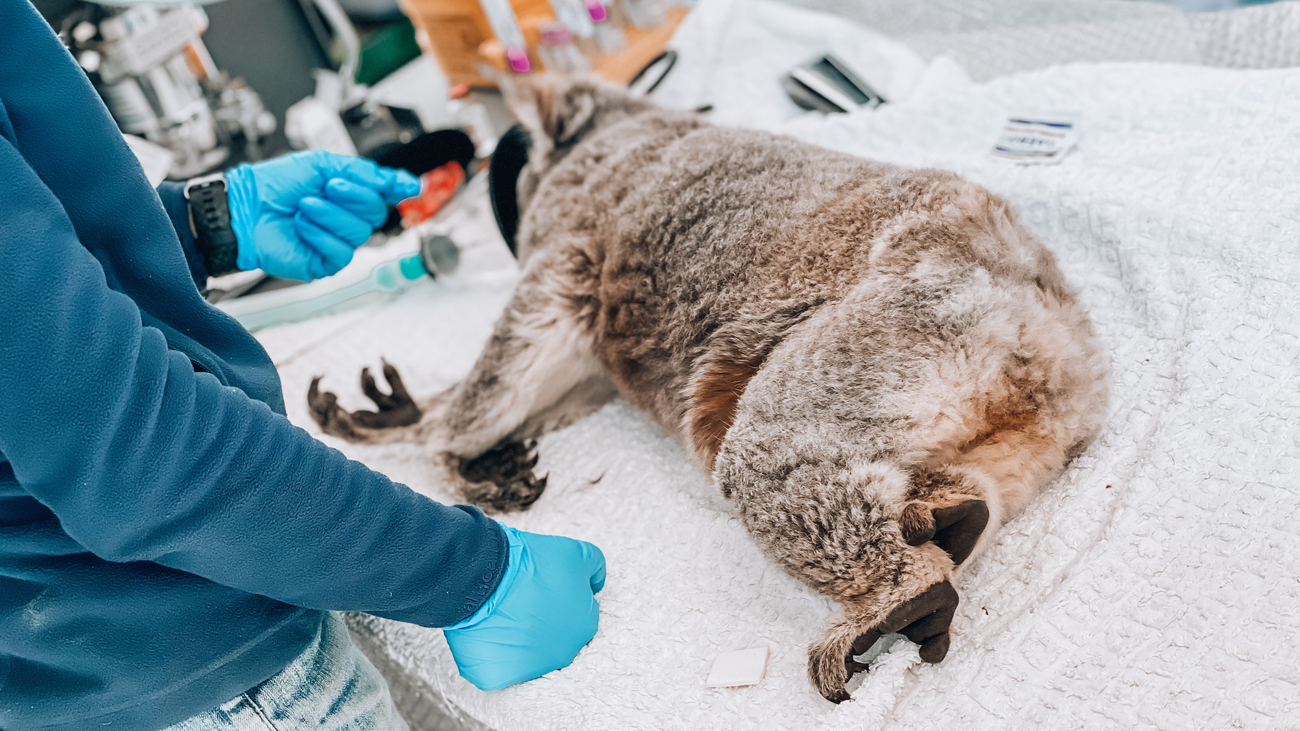Koala Protection: Rescue, Rehabilitate, Release, and Secure - Australia, New South Wales
Planting a future for koalas, one tree at a timerescued koalas, Jessie and Amelia, return to the wild
rescued koalas, Jessie and Amelia, return to the wild
Early in 2020, amidst the devastating bushfires that ravaged Australia, Bear, the IFAW x USC’s (University of Sunshine Coast) koala detection dog was deployed to Peak View in New South Wales, at the site of Two Thumbs Wildlife Sanctuary.
The Sanctuary, run by James Fitzgerald, had been destroyed by the Good Good Fire on 23rd January and was dealt a second blow when a firefighting air tanker crashed while trying to protect the sanctuary, killing the three US firefighter crew onboard. The Hercules water bomber (an aircraft filled with water to dump thousands of litres of water and fire retardant on out-of-control blazes) had been deployed in an effort to regain control of the fires at Two Thumbs as the flames were too large to be dealt with by fire trucks.
Rescuing Jessie and Amelia
“When we heard the devastating news of Two Thumbs Wildlife Sanctuary being destroyed this past January, we deployed IFAW x USC’s detection dog, Bear, to help search for survivors,” says IFAW’s Josey Sharrad.
Bear and the team visited the area to look for surviving koalas in need of rescue. Using the scent of their fur, Bear located a mother koala and her joey. The koalas, named Jessie and Amelia, were brought to Australian National University, where they received emergency care and embarked on a specialized rehabilitation plan led by Dr. Karen Ford. During a checkup, the team performed an ultrasound and discovered exciting news – Jessie was pregnant!
Baby koala seen during ultrasound © Taronga Zoo - Dr Larry Vogelnest
Releasing the koalas
Six months later, on 26th August 2020, it was time for Jessie, Amelia and the new addition to their family (a pouch joey now called Jazz) to be released back into the wild. The family’s release also coincided with that of two other bushfire survivors: koalas Jarrah and Mark.
Vet Arianna, who had been present at the rescue (and a big Bear fan!), conducted thorough health checks of all the koalas, including a quick peek at joey Jazz. With support from the IFAW team, she deemed them all healthy for release!

Jarrah was first to be returned to the wild and the team got ready to trek out to the release spot for Jessie, Amelia, Jazz and Mark. Mark was found as a young, orphaned koala and was placed with Jessie and Amelia during his rehabilitation process. Jessie and Mark developed a strong bond so it was decided to keep them together in hope that Jessie could guide him on how to be a wild koala.
The trio (plus Jazz) were carried in soft, pouch-like bags to the release site where a suitable tree was found for each of them. Koalas are highly dependent on the eucalyptus trees of their native range, so their chance of survival increases dramatically when returned to the same place. The bag was placed under the tree and the koalas, in their own time, hopped out and up into the treetops, with a cursory glance back at the team who saved them.
Since their release, James and the ANU team have been tracking the koalas using GPS location collars and, initially, all four remained close together. As time moved on, they started to spread out a little more and will continue to be tracked for months to come to help ensure their survival.
Thank you to our supporters
The ability to rescue, rehabilitate and release animals back into their natural habitats is the core of IFAW’s mission. We believe that every animal matters. The work that is done with partners and projects across Australia and around the world to help animals in need would not be possible without the help of our generous supporters.
“In the complete journey from rescue to rehabilitation, and onward to the release of these koalas back into the place they call home, we are proud to be have been part of many individual animals' successes,” says IFAW’s Josey Sharrad.
With bushfire season soon expected, IFAW and USC will continue to work alongside partners to be ready to respond to rescue and rehabilitation needs.
help rescue koalas and animals in need and give wildlife a second chance
[iframe url="https://secure.ifaw.org/canada/bushfire-koalas-return-to-the-wild"]
Related content
Our work can’t get done without you. Please give what you can to help animals thrive.